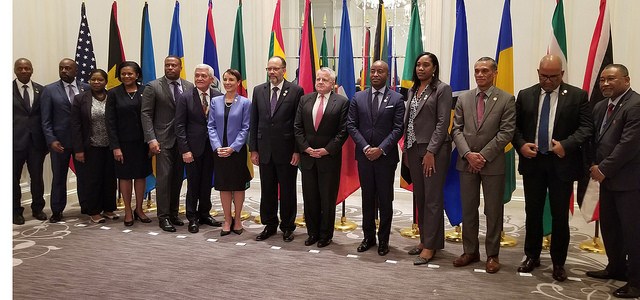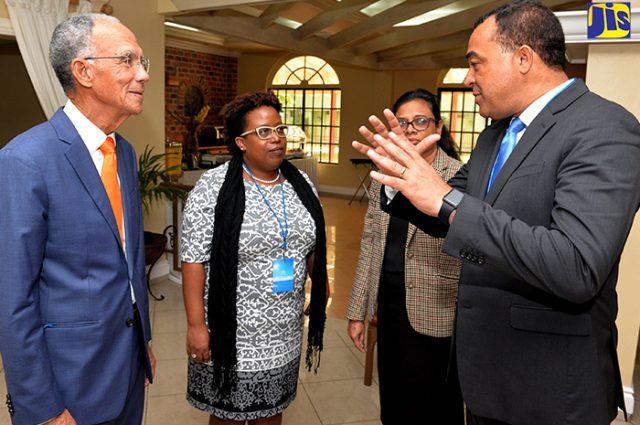- Hon. Gen. (Retd.) Dr. Constantine N. Chiwenga, Vice President of Zimbabwe;
- Hon. Mikhail Murashko, Minister of Health of the Russian Federationand Dr. Tedros Adhanom Ghebreyesus, Director-General of the World Health Organization – Co-Chairs of the Task Force;
- High-level Representatives of Governments;
- Members of the Diplomatic Corps;
- Distinguished Speakers;
- Ladies and Gentlemen.
Good morning.
I would like to thank the Organizers and Sponsors of this event, the Russian Federation and the World Health Organization for the invitation to address this distinguished gathering.
Today’s event hosted under the theme “Mobilizing resources and technical support with and for Member States to deliver the NCD and mental health-related Sustainable Development Goal targets during and beyond COVID-19” is indeed very timely. The COVID-19 pandemic has underlined the risks posed by non- communicable diseases (NCDs) and has exacerbated the problem of mental health.
The pandemic has reminded us that we have many commonalities in spite of differences in size and resources. We experience the impact at varying levels, but what will get us through is multilateral cooperation and actions to address the range of challenges we are experiencing.
Chair, it was in CARICOM that the issue of the silent epidemic of NCDs was first brought to the focused attention of a group of Heads of State and Government. The 2007 Port-of-Spain Declaration on NCDs emanating from a historic summit of CARICOM Heads of Government, resulted in commitments from our Member States to support multisectoral action for NCD prevention as part of the broader development agenda. This, therefore, helped to pave the way for our support to the Moscow Declaration on NCDs of 2011 and UN Political declaration on NCDs of 2011.
Indeed, this year marks the 10th anniversary of this landmark document that attracted the world’s attention to the major problem posed by NCDs, including obesity, diabetes and cardiovascular diseases.
Notwithstanding our attempts to implement the commitments of the NCD Declarations, the Americas still records the highest burden of NCDs, with 79 % of all premature deaths being NCD related.
In addition, mental, neurological, and substance use (MNS) disorders are among the leading causes of the burden of the diseases and are responsible for 19% of the overall loss in disability-adjusted life years in the Region. CARICOM Member States are particularly susceptible to NCDs, as they suffer from vulnerable food systems, obesity-related food environments, trade barriers and increasing food importation costs.
In a tangible show of support to our regional efforts, the UN Interagency Task force on NCDs launched investments in a number of Caribbean territories to advance policies to prevent and control NCDs. This was successfully executed as the work of the Task Force was very instrumental in advancing policies to address tax increases on sugar-sweetened beverages.
In November 2019, the CARICOM Ministerial Councils for Trade and Economic Development, and Human and Social Development agreed that two Inter-Governmental Working Groups (IGWGs) would be established in the battle against NCDs. One focused on Unhealthy Diets and Obesogenic Environments and the other on the Harmful Use of Alcohol for advancing Regional Policies, Programmes and Actions for NCD Control.
Under the umbrella of these committees, technical experts from across the Region led by the Caribbean Public Health Agency (CARPHA) are brought together with counterparts from Public Health England, Public Health Canada, the Pan American Health Organization, Civil Society and the Private Sector to review best practices and to support advocacy for the requisite national policy changes. These would address such issues as the elimination of trans fats in prepackaged foods, the reduction in obesity-related school environments and the generation of revenue from increased taxes on harmful substances, such as alcohol and tobacco.
Front of label packaging is one of the main areas that is being examined at this time. The process for the revision of the CARICOM Regional Standard for the Labelling of Pre-packaged Foods to include Front of Package Criteria has begun. The Front of Package Labelling System is designed to make the healthy food choice the easy choice through a simplification of warning signs when foods are high in salts, sugars or fats. A Regional Technical Sub-Committee of experts was established to draft revised labelling standards. Every Member State was encouraged to establish a National Mirror Committee to develop national standards under the guidance of their respective Bureau of Standards.
In February 2021, a Final Draft CARICOM Regional Standard on the Labelling System was circulated to Member States for national consultation and approval and we expect a final determination and announcement when the Ministerial Council on Health and Social Development meets later this month.
Chair, the COVID-19 pandemic has placed an unprecedented burden on the limited human and financial resources in our Community. Indeed, the International Monetary Fund has identified our Region as the most adversely affected economically in the world. Many of our Member States are heavily dependent on the tourism industry, and the results of protracted closed borders and lockdowns on the already fragile economies are catastrophic.
Even though we had been doing commendably well as a Region in our initial public health responses to the pandemic, with the rise of the Delta variant, we are seeing an exponential rise in the number of cases, placing untold pressure on our health systems in general, and human and financial resources in particular. Every Member State has had to divert monies from other critical sectors to bolster the crisis response. In many Member States the pressure on social services to support the growing and persistent needs of the population is unsustainable.
The COVID-19 pandemic has also placed additional mental health stressors on families, as they deal with lock downs and loss of income. There have been increased instances of domestic and family violence, which has been linked to the deterioration in the mental health of those affected by the social and economic fall-out from the pandemic.
At the other extreme, persons who live alone have reported feeling isolated and emotionally depressed over long periods of lockdown and inability to socialise. This has also been the experience of school children, as they have not been able to attend face-to-face classes and mingle with their friends.
Getting medical services to such persons has also been a challenge. Many of our Member States now have hot lines which persons are encouraged to call, in case of a mental health- related crisis.
Based on lessons from the COVID-19 pandemic, there is urgent need for transformative action. CARICOM recognises the need to regain momentum in our fight against the NCDs and to engage frontally with the mental health challenge. We therefore welcome the establishment of the UN Multi-Partner Trust Fund for NCDs and Mental Health, as this will significantly address the resource mobilisation deficit we are experiencing, and bolster cross-sectoral and whole of society solutions.
This proposed investment will augur well for our citizens and contribute to the achievement of our NCD targets and Sustainable Development Goals. We are pleased to note that this partnership includes UNICEF, UNDP and WHO, and we look forward to working with national governments, non-state actors and other Development Partners to pursue a shared agenda to promote mental health and prevent NCDs in our Region. To regain lost ground in our NCDs efforts, and to address the mental health concerns, policy coherence and pooling of resources across sectors and disciplines are essential.
We welcome this One UN approach with a strong emphasis on whole-of-society solutions. CARICOM is home to just sixteen million citizens, but 60% are under the age of 30. In this context, it is essential that our Member States are supported to develop policies and programs that incorporate the needs of youth, working across the education, development and health sectors. I look forward to a strong involvement from CARICOM countries to ensure this Fund will address their distinct concerns.
On behalf of the Caribbean Community, I express sincere appreciation for the Task Force and its proactive steps in spearheading this effort. Thank you for standing together with us in solidarity for health. I am quite confident that as a united front we can turn the NCD epidemic around and improve access to solutions to address the mental health challenges.
Thank you.






